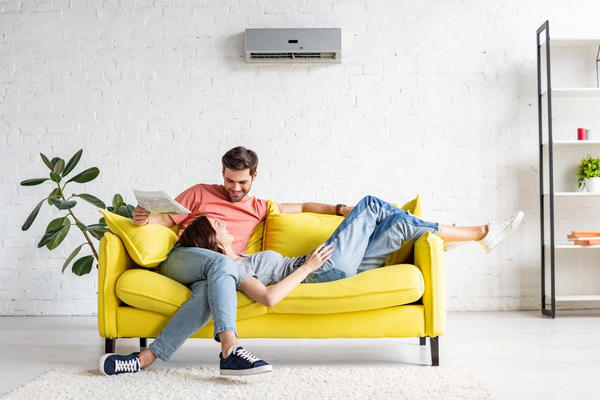The market for air conditioning is extremely wide in the offer of models and manufacturers. In this article, we will show you what to pay attention to when choosing. We will help you to understand a variety of functions – necessary and completely useless. Let’s start with the main thing.
1. Choose a type of air conditioner depending on the area and number of rooms
Wall-mounted split-systems
Most of the split systems are completed with three meters of copper pipes. The maximum allowable length of pipes is 15 meters – the distance between units. The height difference is four meters. The length of the internal block is on average 80 centimeters, the height is 27 centimeters. The split system with a cooling capacity of 25 square meters consumes one kilowatt per hour – this is a good choice for an apartment.
Mobile air conditioners
Included is a corrugated plastic pipe – with a length of 2 meters, and a diameter of 120mm. It is necessary for the output of hot air outside the room. One end is connected to the body of the monoblock, the second is carried out in a window or windowpane. The pipe does not allow installing conditioner far away from the window.
Duct air conditioners
A Duct air conditioner is the best choice for a large apartment or house. The outer unit is installed on the front of the building. The indoor unit is placed in the technical room, in the attic, under the suspended or plasterboard ceiling. Then the air ducts are laid out over the entire area of the apartment. In the rooms will be visible only small grilles for the cooled air.
Multi-split systems
Multi-split systems should only be chosen if you have limited space and can only install one unit.
2. Choose the necessary capacity
How to choose the right air conditioner with the right capacity. For an apartment with a standard window and ceiling height up to 3 m, 1 watt of cooling capacity per 10 square meters is enough. For a room of 20 square meters, 2 kilowatts of cooling or 6,600 BTU is needed.
3. Conventional air conditioner or inverter air conditioner
Inverter air conditioner vs. conventional on/off air conditioner:
– “Inverter air conditioner is economical” – Inverters use half as much electricity and are twice as expensive as conventional split systems. The price difference will pay for itself, with heavy use, in about five years;
– “Inverters are more reliable because the compressor doesn’t start as often” – An inverter does save the compressor, but is very afraid of power surges. Inverter repairs are more expensive and more complicated;
– “Runs quieter” – due to the temperature maintenance feature, you really won’t hear the unit. At maximum fan speed, the noise will become noticeable.
4. What additional functions do you need
The functions of household air conditioners are divided into two groups:
1. Standard – equipped with all modern models. They come “by default”:
– Night mode – lowers or raises the set temperature when you sleep;
– Turbo – quickly lowers the temperature in your room;
– Dehumidification – reduces the humidity in the air;
– Timer – setting the time of switching on and off the split system;
– Ventilation – in this mode the compressor is not activated, the internal block works as a fan. There is no air coming from outside.
2. Additional – depending on the model and manufacturer:
– ECO – energy-saving mode;
– WI-FI – control by smartphone, remotely via Intenet connection;
– iFavor – saving the settings in the remote control memory;
– iFeel – the temperature sensor inside the remote control will be a guide for the air conditioner in maintaining the set temperature.
5. order high-quality installation
The proper installation is the key to the long-term work of the air conditioner. When choosing an air conditioner choose a professional crew as well. Our air conditioner installers will carry out the work as quickly and efficiently as possible, and the managers will help you to choose the right air conditioner for your apartment or house.
Conclusions
– For a small room a wall-mounted one will be quite enough, for a larger room it is better to choose a channel one;
– Choose a power with a small margin;
– Ordinary (on/off) is easier to maintain and much cheaper. The inverter is quiet and economical;
– Don’t overthink the selection of features. Standard ones will satisfy all your needs;
Contact us.
